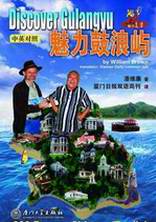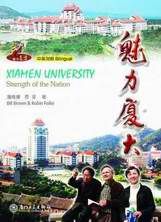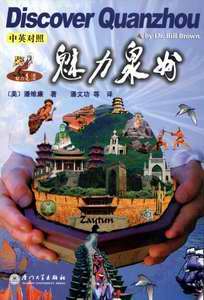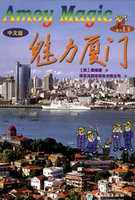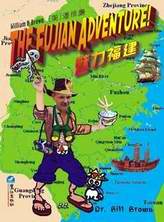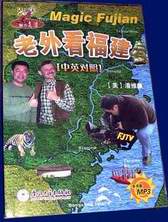![]() Click
to
Access
Click
to
Access
AMOY MAGIC SITE from
OUTSIDE China
![]() Click
to Access Amoy
Magic Site from
Click
to Access Amoy
Magic Site from
INSIDE
China ![]()
TRAVEL LINKS
![]() Xiamen
Xiamen
![]() Gulangyu
Gulangyu
![]() Jimei
Jimei
![]() Tong'an
Tong'an
![]() Jinmen
Jinmen
![]() Zhangzhou
Zhangzhou
![]() Quanzhou
Quanzhou
![]() Wuyi
Wuyi
![]() #1Fujian
Sites!
#1Fujian
Sites!
![]() Fujian
Foto Album
Fujian
Foto Album
![]() Books
on Fujian
Books
on Fujian
![]() Readers'Letters
Readers'Letters
![]() Ningde
Ningde
![]() Zhouning
Zhouning
![]() Longyan
Longyan
![]() Sanming
Sanming
![]() Putian
Putian
![]() Bridges
Bridges
![]() Travel
Info,
Travel
Info,
![]() Hakka
Roundhouses
Hakka
Roundhouses
![]() Travel
Agents
Travel
Agents
MISC. LINKS
![]() Amoy
People!
Amoy
People! ![]()
![]() Darwin
Driving
Darwin
Driving ![]()
![]() Amoy
Tigers
Amoy
Tigers
![]() Chinese
Inventions
Chinese
Inventions
![]() Tibet
in 80 Days
Tibet
in 80 Days![]()
![]() Amoy
Vampires!
Amoy
Vampires!
![]() Dethroned!
Dethroned!
![]()
![]() Misc.Writings
Misc.Writings
![]() Latest
News
Latest
News
![]() Lord
of Opium
Lord
of Opium
![]() Back
to Main Page
Back
to Main Page
![]() Order
Books
Order
Books![]() Xiamenguide
Forum
Xiamenguide
Forum
Note: Please click
thumbnails for larger photos
"The
China Story--Recollections of a Little Girl's Life in Amoy, China"
(1851-1859) Part 1
by Mary Augusta Doty Smith, Daughter of Elihu Doty, RCA Missionary to
China, 1844-1864
Part 1
Part 2
Part 3 Part 4
Part 5
Part 6
Elihu Doty Page
Amoy Mission
Ms.
Jean Watson, Secretary, New Jersey Postal History Society, and
author of "Doty's
Garden", providing this copy of Mary Augusta Doty Smith's (1851-1937)
fascinating 80-page account of her first eight years of life on Amoy.
(She is nicknamed "Pussie" in the story).
Mr. Elwood, Geiger,of South Dakota, a descendant of Elihu
Doty, kindly provided the Doty photos, and permission to use Mary Doty's
story. Mary J. Geiger was given a carbon copy, with handwritten
corrections and additions, and retyped it in Spring, 1972.
Obtain more Doty infofrom Reformed Church of America (RCA) archives at
www.rca.org
Continued from Part 5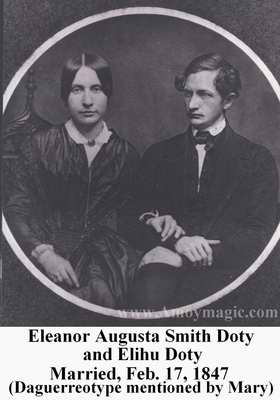
[MotherˇŻs
Death]
One morning in February, 1858, there seemed to be a tense atmosphere in
our home, and people moving about. Mrs. Talmadge was there, and mother
in bed, and soon weˇŞCharley, Sam and I with haby "Mousie",
two years oldˇŞwere told there was a new baby sister in bed with mother,
and we were brought in to see the little head nestled on her breast, a
very great wonder and delight to us children.
We were then sent out to the nurses. So for a week or two; then one morning,
when we were quite noisy, father appeared and the sadness on his face
impressed itself on me, even then, as he came to each one of us and laid
a finger across our lips, with not a word said; but we understood we were
to be quiet. Then later, my dear Mr. Sandeman lifted me up in his arms
and carried me to the head of the bed on which mother lay; and I was told
by him, that God was taking my mother to be in Heaven with him. And he
held me in his arms until her breathing ceased, and comforted the little
girl's sorrow in gentle ways. The agony on my father's face, I seem to
remember plainly.
Then at once, a way to nourish the little baby had to be found. Old boa
put warm milk in a blue and white teacup, with a piece of cotton soaked
in it, one end of which was held by her finger to the mouth of the baby
to suck. It seemed to succeed, and so the little wailing baby was fed
until it died, a few months later.
Mother was beloved by the whole circle of foreignersˇŞmissionaries, merchants,
and officers of American and British vesselsˇŞand all Chinese men and
women with whom she came in contact. There was a large funeral. Some points
I can recall. A long line of Chinese women came, in their mourning garb
of white, filing in, to look on her face, with wailing and mourning.
There must have been a short service at our house, then we older children
were led by some one (I dressed in black, with a cape and collar trimmed
with crepe) out of the house and down on the wharf to a boat. There was
a long procession of these loaned by ships in the harbor and manned by
sailors. Each boat with an American flag at half mast, trailing in the
water from the stern, followed the first boat which carried the coffin
(no caskets in those days), wrapped in our flag, over to Kolongsu
Island, where the Missionary Cemetery is located.
As we came to the Landing, the sailors on all of the boats raised their
oars upright, while the American sailors in the first boat lifted the
coffin to their shoulders, still wrapped in our flag, and walked, so,
to the Cemetery, all following closely behind. And mother was laid in
her grave by loving hands, and the familiar "I am the Resurrection
and the Life", repeated over her body by Mr. Talmadge [Talmage],
very probably, as father's closest associate.
We stayed in Amoy until October, 1859. We
were cared for through all those months after our mother died, by kind
friends among the missionaries, in ways a man, and a busy one in his own
work, could not well do. But father was a very unusual type of man, being
able to assume the cares, to a degree, of mother as well as father, and
he always kept us together in our home.
We spent many days and hours with our kind friends, Mr. and Mrs. Talmadge,
whose four children grew up with us, and of nearly the same ages. "Auntie
Talmadge", as we called her, taught a little school for her children
which we attended, as we had become old enough by now to begin studying.
She kept an oversight of our clothes, too, with other loving hands to
assist; as well as with a Chinese tailor, who used to work under mother's
directions and patterns.
During this time, a young man, Mr. Rapaljo, joined the mission; and I
think he must have lived with us, as we saw him in so many intimate ways
at all times. We children loved him; he was like an older brother, telling
us stories and incidents of interest, and accompanying us on our jaunts
and making, or mending toys, and aiding us in ways that mother used to
care for us, at times. Only a few months ago, I saw the notice of his
death, in his ninetieth year. He had been living only a few miles from
our home, after retiring from his missionary work; and I did not know
it, or I would have tried to renew our acquaintance.
At last the time came when we constantly talked of going to America. Father
was always packing boxes of books, or bric-a-brac, or other commodities;
and the ladies saved for the children, or directed the Chinaman tailor
in making clothing for the long three months' journey, in which we could
have no laundry work done on account of lack of fresh water.
Mr Rapaljo was like a strong arm for father, whose health had become frail,
or was like an older son to him.
Finally the day arrived when the clipper ship "Kathay" dropped
anchor in the Harbor and began unloading her cargo. At this time, when
she was the lightest, and sat up high out of the water, we rode out and
around her to see our home to be, for three months. Little Mary, so easily
frightened at guns or unusual sights, made a great disturbance, begging
not to be put on that ship; it was so thinˇŞlike a board set up on edgeˇŞand
it would surely tip over! It caused me much unhappiness, when my implorings
were unheeded, and all plans kept maturing to go on board of her for the
voyage; until a later day, when father took us out again, and the ship
sat so low in the water, as to make her satisfactorily broad; and my troubles
were over.
The Mission boat carried out to the "Kathay", the boxes, large
and small, and pieces of baggage; no furniture--that was disposed of among
our friends, until only the bare necessities were left to go with us.
Our ship had changed her position in the Harbor to one farther outˇŞtowards
the open sea, to catch better breezes and tides. There were no other passengers
on board.
The farewells were said to many friends gathered at our home, foreign
and native ones, very heartfelt and sad ones to the elders, but which
did not carry much sorrow to the children, in the midst of keen interest
in the new adventure before us.
We all gathered on the deck of the Mission boat, with a group of friends
accompanying us, and started away to the "Kathay", in the afternoon
sun of early October. We were not to set sail until sometime in the night.
Soon we spied, far back towards the city, a speck on the water, hardly
distinguishable at first, but growing clearer, it proved to be a rowboat,
with someone waving a white cloth vigorously, and oars flashing through
the water; and we all concluded some one was coming to our vessel, and
watered eagerly, until a Chinese friend called, "The children's kitties
were left behind, and we have brought them in this bag." "Tommy"
and "Tatty", our dear white kittens! There was a look of consternation
on the faces of our elders, and a bit of guiltiness, too! But we held
our precious pets tightly, with set lips. Those unspoken words said, "We
will never give them up!" But a huge dog came bounding along, followed
by a terrier; and every hair on the kits' backs stood on end, while hisses
and growls gave an accompaniment to their intentions, and a battle royal
was imminent. So, egged on by harrowing tales from an officer, of the
tearing to pieces of our pets, which were dealt out to usˇŞas the least
of two evils, we tearfully gave them back to the good friend who had brought
them to us, as a parting gift. Although, in fact, they had been given
away to one who would care kindly for them, by father, before we left!
As darkness drew on, the last farewells were spoken, and the Mission boat
turned its course about again towards the Harbor, and father took us down
to our berths, and tucked us in for a long night's sleep.
The next morning, when we came on deck, our eyes met the vivid blue water,
and white caps, and sails bellowing out, and foam cutting our prow and
seething from the stern, but no land! Our first new sight on the great
adventure!
We found many things to busy us, at once.
The first experience was when father called us down to the cabin for morning
prayers. We felt so full of life and eagerness, under the new aspects
of water, and ship, in motionˇŞso different from the quiet rippling, waters
of our rowboat trips, and the furled or flapping sails in the HarborˇŞthat
we begged to wait a little! Alas! Prayers were hardly spoken, before we
began to feel queer, and a little resentful, too, thinking if we could
have stayed up on deck, we wouldnˇŻt have had to get into our berths for
a week of seasickness!
The other children were over it first, and I was carried up, and laid
on a mattress, on the deck, to let the pure salt air work its healing.
Every detail of these first days, was deeply impressed on my mind. I wore
a red dress, plaidcd with orange threads, quite Chinese-y, with little
red buttons which looked like carnelian, down the front; and was lying
there quite limp and forlorn, when a great comber dashed over the deck,
drenching me and floating me about on the receding wave, not near enough
to the side of the ship to make danger of being washed overboard, however!
I became entirely well from the seasickness after this experience!
We discovered many things as we roamed over the deck, though were not
allowed on the forecastle. There was a large cage, about three feet high,
for chickens, placed over a pen full of little pigs, whose pink noses
always amused us, as they put them and front feet on the railing, and
squealed, while the chickens thrust their heads and necks out between
the slats, and cackled or scolded, at the same time. There was a pen of
geese, which never seemed to interest usˇŞthey hissed at us so viciously.
And there were monkeys "fore and aft", and the great Newfoundland
dog, for which we formed a warm attachment, which he returned towards
us all. The little terrier we never seemed to have anything to do with.
Charley, Sam and I were old enough to do things together, just ten, eight
and six. "Mousle" trotted about with "us, when she wasn't
snuggled down close to her father, talking away to him, for she was the
baby, and very close to him, and he to her. She often called him "Dominie",
prefacing conversation with "Well, dominieˇŞˇ°. We used to hear the
ministers greet each other by that name, and she took it up!
One day we asked a Mate if he would sell us a chicken, which we could
keep in our part of the ship for a pet. He said yes, for a very shiny
Chinese penny, cash, with a square hole in the center of itˇŞit must be
that!ˇŞand also asked where could we keep it, out of its own cage?
We said, "We could keep it in one of the deep coils of rope which
were about the deck." (and often in use.)
"Very well," he said.
O! The faith youngsters have, even if they are so foolish! We scoured
and scoured the penny, and trailed it in the water over the stern by a
string tied in the hole, but it came up no shinier, and we had to give
up our pet chicken. Then the mate suggested if we could sprinkle salt
on the tail of a seagull, of which many followed our ship, we could catch
it, tame it and have it for a pet.
So, eagerly we started out on this trail. At times, when the ocean was
rough, the bow of the ship rose high on the ascending crest of a wave,
while the stern dipped low down, and we watched for the right conditionsˇŞthe
descending stern, and some gulls floating near to us, both at the same
tineˇŞwhich recurred more than once. We were ever ready with the salt,
but, alas! another disappointment met us! But sorrows do not weigh heavily
on children, and our happiness was soon restored.
We sailed down through the Straits of Sunda, between Java and Sumatra
Islands, which became real places, with green grass and trees and people
on them, instead of just names which we found in our first Geography lessons!
And so with the Island of Madagascar (and all places on the coasts that
we saw) where we cast anchor. I recall the high green banks of the shore,
and boats swarming about us, with their waresˇŞmostly fruit and vegetables.
There were pumaloes (like grapefruit), and plantains and bananas, yams
and mangoes.
Some of these were stored away, to be dealt out later, when we had been
longer away from any fresh fruits and vegetables. Some perishable, like
mangoes, we ate at once; and then threw our yellow stained dresses, and
linen coats of the boys, over to the fishers, according to the way we
always had to do with our most soiled clothing. There was no mother to
wrap us up in sheets; and probably she would have followed the same course,
as the only available one to do, if she had been with us!
Another incident comes to my mind, concerning mangoes. When we reached
grandfather's house, in the early days when everything was new, someone
spoke of mangoes for dinner; and I was delighted to find our favorite
fruit grew in our new homeland; but when they were placed on the table,
what appeared but green pepper sour pickles!!
The yams served us longer, and for two purposes: first, as a vegetable;
they were not like the yams we know here, but of a grey color, and when
prepared, somewhat of the texture of mashed potatoes, which we children
liked. Then they served as one of the entertainments of our days. We liked
to gather at the galley, to see the cook turn the fried yam, by tossing
it up and catching it exactly in the right spot in the pan, only the other
side up, showing the golden brown of the finished product! This was our
delight, and the cause of a superior, triumphant look on the cook's face,
as he always succeeded!
Our food was, as would be supposed, simple and wholesome; but with no
meats (except corned, and of long standing in casks of brine, with suggestive
consequences!). There were no refrigerators in those days, or live stock
on board, other than the fowls and pigs, from which we were often served.
Boiled plum duff comes to mind and black molasses, in which we reveled!
There were the big, thick, sea biscuit, at any and all times.
If our food was liquidˇŞalas! Alas! Such consequences may have followed!
A lurch of the ship at the moment when a spoon was half way to the mouth,
caused a landing in nose or eye, or down the front of clothing! And a
lurch back of the boat, ended in disaster, with bowl or plate shunting
to the other side of the table, or on the floor, and the contents madly
splashing back and forth at the will of the waves!
Dreadful to say, we children drank black tea or coffee, three times a
day! I often wonder whyˇŞprobably lack of good drinking water, and no
milkˇŞCondensed or powdered not known then.
Monkeys were our delight, and terror, too. One little fellow was a pet
of Captain Stoddard. Often his tiny fingers ran through his hair, as he
sat on his shoulder, delighted if it found a delicious morsel! It was
often given lumps of sugar by him.
One day little monkey was quietly enjoying his treat, within range of
my arms. Quite wickedly, I pinched its cheek, protruding with a lump,
with results I did not anticipate, for he flew at me in a great rage,
and bit my side through the thin clothes I wore, leaving a scar which
my morning bath can reveal to this day, if I cast my eye in that directionˇŞa
a daily reminder of a long ago experience. Screams brought a crowd about
me, ready to enjoy any diversion in their monotonous lives, whose grinning
faces seemed to say, "She got what was coming to her!", if put
into modern parlance.
I had a pet sailor, Sebastian, who made or repaired sails. His bunk was
a cubbyhole full of sails and materials, on which he curled up for his
night's sleep. I used to watch him spread out the sails on the deck, and
match patches to put over rents, and then see him put the palm over his
thumb and push, in and out, the big needle and cord he sewed with, while
telling me sea yarns!
We had another kind friend on boardˇŞthe stewardess, Ann, who always fitted
into needs of many kinds, at all hours, even helping me try to sew; for
the passion of my long life was developing in those early days. I made
doll clothes on the shipˇŞsuch as they wereˇŞbut assisted by Ann, they
answered the purpose. I attempted a hat, asking her for material, and
was given a bit of red and black dotted calico or print. I cut a round
of stiff paper for the top of the crown, and. sewed the calico on, and
joined it to a straight piece for the band around; then cut a shape with
a hole in the middle, for the rim, which was sewed on to the bandˇŞaltogether
quite a satisfactory hat, with crown, band and rim; and I felt the thrill
of a creator or inventor, I do believe! The little red and black calico
hat was precious to me, as I caressed it and viewed its wonders!
Then my wings were clipped, and I came down to earth with disappointment;
for it was too small for my dolly's head and never could be worn! A lesson
was learned then and there, which has stood me in good stead throughout
my life. One should take measurements before undertakings; and when one's
head is among the clouds, a foundation in facts is most valuable.
The next sight of land on our long voyage was the Light House on Cape
of Good Hope, and a strip of gleaming white sandy beach, which father
called our attention to, with the surf rolling up and breaking over it,
as ever it does; and then talked to us about Africa, and this sight which
we might never see again, but which would be interesting to remember.
One night, as our ship was turning towards northern waters, father called
us together again, and pointed out the Southern Cross, telling us to note
the four brilliant stars which formed its head and foot and arms, so we
would well remember this too, for that would never appear in our sky of
the Northern Hemisphere. We had often seen the cross while in our Amoy
home, but this talk fixed it clearly in our minds.
One day while in the Southern waters, there was a shout, "Whales
ahead.ˇ± One big fellow was spouting water, and soon we were riding through
a school of them, which we could plainly see, close to the side of our
ship, many of them together. They were not ferocious, and apparently eager
to get away from us, and soon passed on.
The sailors had great sport once, catching a shark on a large hook, baited
with a piece of salt pork. He must have been hungry, for he sprang for
it eagerly, and was brought aboard on the forecastle deck, and thrashed
around in great fury until exhausted.
We passed a ship only once, and signals were given; but no valuable information
was gathered, to the disappointment of Captain Stoddard and father.
Father helped Captain Stoddard with the Quadrant, and keeping the daily
log; so we had continued illustration, long before lessons from Life began,
that,
"One ship drives east; and one drives west,
By the selfsame wind that blows;
'Tis the set of the sails, and not the gales,
That tells which way we go."
One day parts of
a wreck floated byˇŞa piece of hatching, a spar, part of the mast, and
other debris. We felt awed, as we knew some poor sailors and passengers
had gone down.
We encountered one great storm. The children were kept down below for
a day or two, and the foul odors of that imprisonment still remain. Finally,
towards evening, we were allowed to come up on deck to see great waves
rising and falling, and breaking over the decks, and deep blue sky and
dark water; all ominous to us, though known to our elders to be vanishing
clouds instead of gathering ones.
A little bird was driven against a low sail. Father caught it, and the
poor little creature was so exhausted, it made no resistance. We put it
in a box, and took the best care of it that we knew how, with warm bits
of cloth to cover it and something to eat and drink, all of which was
untouched as we constantly peeped at it as it lay as if nearly dead. We
were filled with high hopes of keeping it always as a pet, if it lived.
But the next morning, on opening the box and peering under the covers,
the bird lifted its wings and dashed offˇŞas we watched it as long as
it could be seenˇŞprobably to its own destruction still, as no land was
near. It had been blown by high winds out of its course near some shore.
So we lost our third pet!
As long as we were in the warm zones, I had my daily tub from the broad
ocean, for if "Mahomet couldnˇŻt go to the mountain, the mountain
could come to Mahomet". Sailors drew buckets (gutta-percha ones,
instead of wood or metal) full of water and poured them over my head,
as I stood in a bright red tub, in my nightie, my father always standing
by me in faithful guardianship! The other children did not relish the
downpour of salt water, and were excused.
As we came up the Atlantic, we reached the Doldrums. When I first read
"The Ancient Mariner", a part of it seemed like a "twice
told tale", vivid and true, for we, too were "as idle as a painted
ship upon a painted ocean". As we saw it for days, the sea was like
glass, with rainbow-hued jellyfish floating everywhere, and sails hanging
limp, while the heat was intense, and the sun almost blinding.
Then a day came when a riffle struck the glassy sea, and the sails stirred
restlessly. "Old Glory" lifted its head, after hanging so dejectedly
from the mizzen peak. The commanding Voice called to man the sails, and
the "Aye, aye "s came promptly, as the sailors climbed the shrouds.
Soon we were moving off from our camping spot, with ripples hitting the
sides of the ship with increasing rapidity, and we were speeding away
again.
As we neared the Equator, father called his children to him, saying, "We
are going to cross the Equator soon, and if you will look through the
spyglass, you will see the straight line across it.ˇ±
We gazed in wonder and awe, and there it was, plainly to be seen! The
mates stood around with twinkling eyes and twitching lips!
At last, Pussle's wits worked, and she exclaimed, ˇ°We can't see the Equator!
Now I know why you took one of my hairs yesterday. You wouldn't tell me
then!" And we shouted in glee that we had caught him.
At last we came to the cold days in the North Temperate Zone. It was January.
I do not remember any sensation of it, until we reached the shore. Father
put woolen underwear on us, which we said "pricked", however.
It must have been a mild winter, for it is easy to recall scenes of ships
docking, laden with ice hanging from masts and sails, or covered with
snow.
Then one morning early, the Captain called down to our cabins, "Land
ahead!"
We rushed up on deck, and looked and looked, but saw nothing, until father
pointed to the far horizon and said that dark line out there was not a
cloud rising over the water, but Land! and it was America!
As we watched, the line grew plainer and higher. Our time from then on
was occupied in seeing new sights. We thought the land was very sandyˇŞnot
like the coasts we had seen, with grass and green trees. Later, when closer
to it, it looked as if it were covered with patches of sugar! But father
said no, it was snow and ice, which we had read about in our stories,
in way off Amoy, but which we had never seen!
Then the Quarantine Officers appeared. I remember being puzzled as to
why I should have to undress before these men, and finally seem to please
them!
Our ship was still making its slow way up toward the dock on the East
River. Steamers with their fast motion were not the universal ships which
are seen today, we must remember.
Such sights as met our eyes on the water, and such houses on its banks!
And the great forts on either side of "the Narrows", with guns
glaring out at us!
Finally we came to land, and the clatter of anchor chains roared again.
Friends came at once on board to greet father and "the childrenˇ±;
not our very own onesˇŞthey were too far away to make the trip to Mew
York City on the uncertainties as to when we would arrive, with no telephones
and few telegraphs, or any wireless, to announce that we had been sighted
off shore. But what curious sights greeted us from our dockˇŞso many carts
drawn by horses, new to us. Specially fascinating to us were the little
houses drawn by them tooˇŞsomething like the sedans we had been accustomed
to, only these had horses in front, instead of coolies in front and back.
There were no coolies to be seen anywhere, or Chinese men of other ranksˇŞnot
a single one!
Father was busy meeting friends and customs officials, and with overseeing
the unloading of our baggage and boxes from the freight holds, but he
stopped to tell us that these little houses were carriages, and that we
would go in one of them soon! It was hard then to possess our souls in
patience!
At last we bid good bye to Captain Stoddard and one or two favorite sailors
and Ann, and our home for three months, and descended the ladder down
to "terra firma", which reversed the order and gave us unsteady
"land legs", instead of sea ones; and found ourselves in one
of the wonderful little houses, jogging along the wharf and into the street.
We stopped at a little store, and father took us all in, to be fitted
to scarfs and mittens, which were other wonders to usˇŞour hands and necks
and ears to be covered!
The next surprise we met was when we left the carriage and father said,
"We are going to cross the River now, over to New Jersey.
We sat very still in a stuffy, dark room, with bits of windows high up,
out of which we could not lookˇŞfar different from the fine boats and
large low windows which command the view up and down the river, of the
present dayˇŞand wondered when we were to get into a boat and be rowed
over; and were altogether puzzled to learn that we had crossed it already!
That was once that father did not sense that the four little ignoramuses
could not understand how we crossed, with no boat or boatmen in evidence,
nor a large sail-boat either,ˇŞjust sitting still in a dusky room and
getting there! Ah well! He had many deeper thoughts stirring his heart,
and questions to ask himself, and to answer; and sad memories were beginning
to meet him, as old reminders crowded about him, and thrust themselves
upon his sight.
In those days, railroad travel was very primitive, and trains few and
far between, and no stations nearer to grandfather's house than Newark
or Morristown. So father's inquiries as to when we could get to Morristown,
brought the information that nothing but a freight train would be going
for hours, though the conductor said we could ride in the caboose of this
one if we wished, which we did. It was our first experience in seeing
a railroad train, or riding on one, add very exciting it seemed to us,
and satisfactory, too, to be really riding on one, a mode of travel which
we had only seen in pictures!
At Morristovm, we were told Hiram Smith's four horse or mule milk wagon
(full of milk cans) was at the station, and. we saw itˇŞgrandfatherˇŻs
big wagon, full of milk!
We took a hack and started out on the seven miles' ride to Troy, to the
Homestead. We had warm coats made of woolen material and lined with flannel,
with long sleeves and skirts--the boys' much like the girlsˇŻˇŞbut underneath,
our girls' dresses were low-necked and short-sleeved, and we possessed
nothing else but clothes provided for tropical conditions. We were so
full of excitement and wonder that, apparently, we did not feel the cold
of a ra\v late afternoon in January, until we began to say "our feet
pinched us. Ah! The cold had struck i, and we were only about half way
there; and very little protection in the hack's blankets. So father said,
"Sit on your feet, children; curl them up under you", which,
as I recall i, seemed entirely satisfactory, or we were warmˇŞfilled with
thrills; for this was what made ice, which our pictures of boys skating
had shown!
About four o'clock, I judge, of a dark, cloudy winter evening, we drew
up to the front gate of our grandparents' home, too young to feel sentiment
further than that it was cur dear motherˇŻs home, also.
In those days, with no telegraph accomodations out into the country, it
was only known that the "Kathay" had been sighted, and the family
knew that some day soon, father and "EleanorˇŻs children", would
arrive. Grandmother's welcome was the first for us, as we were met at
the front door, given in silence too full for utterance, and then we went
through "the hall" into the sitting room, where grandfather's
greeting came. As a little child, I felt the chill and awe of all this
silence, but with later years, I realized the great ordeal it was, and
the flood of memories which rushed ever the grandparents and over fatherˇŞof
the last time father had stood in the same room, but with the beloved
daughter by his side, just leaving for the great and terrible adventure;
and now the return without her, but these four little onesˇŞEleanor's
childrenˇŞin her place. Soon Aunt Marcia came in. She was a child about
ten years of age when they went away; now, a mother of two children, one
horn three weeks before our arrival (and she was at her father's house
for a time)ˇŞBaby Kellie, whom I took to my heart then and there, and
used to rock and sing to her, whenever opportunity offered.
When we saw Aunt Marcia, we older children were filled with awe and wonder,
and did not speak to her, but clung to father's arms and coat and whispered,
"Is she mother? I thought mother had gone to HeavenˇŞthe likeness
was so strong to our childish minds!
At once there had to be arrangements made for us. The rooms had been prepared
and waiting for days, but it was January, and an open fire should be built,
and the room warmed, before we could go upstairs; and our little girls'
dresses were made for tropical weatherˇŞlow-necked and short-sleeved!
[RiceˇŞnothing
else!]
We older children accommodated ourselves to the food offered for supper,
but little "Mousie" insisted on rice. Whether some good angel
had directed rice to be prepared for that meal, or whether we waited until
some could be cooked, or whether a coming appetite forced a compromise
on bread and milk, it remains a clear recollection that she always asked
for "des rice, nothing else", three times a day! At home, or
at some one else's table, it grew to be recognized as an imperative necessity,
for many days!
The very next morning, the first thing of importance seemed to be to get
material to make high-necked and long-sleeved aprons for us (boys always
were covered!).
I offered to sew on them, very maturely, to be sure, but sewing seemed
to be my only accomplishment, and perhaps a little bird had told of some
of my efficiency in that line. Grandfather asked if I had a thimble, which
I did not have, quite remarkably, I think! And he said, "We must
go to a little store near by and buy one"; and also some gingham
should be provided there too. So hand in hand, he and I walked over there,
on the hard, frozen ground, which seemed very rough to my feet; while
my eyes looked out on big patches of snowˇŞthe first snow storm was still
before us, mantling the whole countryside in white.
Then an apron was cut, and in time I was given a hem to do, feeling very
grown up, to be sewing with my grandmother and others, rushing the covering
of those bare arms, which I have no recollection of ever feeling were
cold, howeverˇŞso much so that grandmother remarked we must retain, still,
some of the tropical heat in our veins!
I do not have a clear idea of when we first met Aunt Mary. She was away
at boarding school, in Montclair, when we arrived, but soon came home
to see us.
Grandmother's health began to show the long strain of cares she had borne
with her own large family and household responsibilities, and it became
evident that she could not meet the new burdens alone. But devotion to
the beloved daughter made a decision positive, that the children must
stay in "Eleanor's home", and be cared for by them. Who, then,
was to take the large share of the burden, but this young girl, still
in boarding school, which she must give up, after that year, for a time,
if not alwaysˇŞsixteen or seventeen years of age! Think of our carefree
girls of that age now, if they were faced with such responsibility to
be laid upon them.ˇŞˇ°As thy days, so shall thy strength be", proved
true for her, with these unnatural burdens laid upon her.
With fine courage she met them, and was the faithful, efficient and loyal
guardian, spending her powers of mind, heart and hands continually; until
one after another of the four children were to the ages of going away
to school or college, and then making places for themselves in their own
niches in life. It was a long, unselfish devotion, given freely and loyally
to the children of sister she never knew.
One little memory still persists of this first week. We attended the Methodist
church, at this time, as our own church was undergoing alterations and
repairs, to produce much the same one which we know in this day.
On that first Sunday, we all went to that church and filled to overflowing
our seat, or seats. The minister cane down from the pulpit to our seat,
and invited father to take a place with him, which he accepted, following
him there. Little ˇ°Mousie" always expected to go wherever he went,
and she slipped off the high seat and followed too, creating quite a consternation,
as he turned at the steps, and found who purposed to be tucked by his
side up there! "Mousie" was a very determined little body, and
it took some persuadingˇŞapparent to the whole congregation, eagerly looking
on, and wondering who would be victor. Then the little maid was led back
to her proper peat, and he returned to his, and. the service opened.
[Third Culture
Kids] Many visitors, quite naturally, came to sec us,
some with deep, heartfelt interest; some out of curiosity, somewhat as
if they were at a circus, and looking at strange specimens. We were beset
to talk in the Chinese language, which was far more amusing and wonderfulˇŞin
the utter Ignorance of all things foreign at that timeˇŞthan in this day.
And they laughed at us, we thought, instead of at the odd language, so
we ran away and hid on occasions.
I remember crawling as far back as I could get under our bed once, and
had to be brought out, because some one in particular wanted to see me.
There was a little girl with her, which was reconciling.
We four youngsters deliberately purposed to forget the language as soon
as possible, by refusing to use it, whenever possible to avoid it, which
we succeeded in doing quite readily.
One remarkable condition developed in those first days. The unpacking
of clothing prepared, in Amoy, for the long
voyage without laundering, revealed a quantity of dresses which had never
been unpacked, all made of cheapest print materials, to be used only once
and thrown overboard. Also there were articles stained but not soiled,
among them, which father had put into a large canvas bag. What was to
be done with them all?
Word was circulated among needy ones, that these thing could be had for
the asking, which brought calls from far and near; and so they gradually
disappeared.
I had an indefinite idea, which this sewing bee must have quite strengthened,
that I was a young lady now; because my winter coat was made on a yoke
and pleated at the waistline, but left open to the bottom of the skirt.
Now this was the way the young ladies in Amoy
dressedˇŞMiss Katie Stronach, and mother, and othersˇŞon occasions, in their
morning gowns floating open, with embroidered petticoats showing underneath
them. And here, I thought, they had made dresses for Mousie and me just
like these!
So, after a few days, IˇŞthe young ladyˇŞwith my younger lady sister, came
down stairs, hand in hand, in our morning gowns, and our thoughts up in
the clouds! After my explanation of young ladyhood, we had it explained
that these coats, mine blue and Mousie's a gay plaid, were not dresses
to be worn in the housc, but coats for out of doors in the coldˇŞthey were
too warm for the house, and we had to come down to earth as little girls
again!
We were soon introduced to school, and found really American boys and
girls, not so different from those few we used to know, either.
After a year with us, father was urged to return to his work, as before,
when he left his two children in this country. The Voice, which always
claimed his highest loyalty, led him to lay this request before the grandparents
and aunt.
When they consented to his returning for a few years, I think four, he
turned his face toward the East again. Strong to endure, as all his course
of life showed him, he accepted this sacrifice a second time. It was no
light burden he left behind, and a deep sacrifice, accepted by those caring
for us, as well as by him.
Just before he left us, he gathered us together and asked us to promise
we children would continue the morning prayers he always had with us;
which we did faithfully for the four yearsˇŞor until the oldest one, Charley,
went away to schoolˇŞbefore going to school in the morning. We each read
a few verses from the Bible, taking a book in consecutive order and then
selecting another book, and each prayed.
It was a peculiarly trying time for father to leave his beloved country.
He left in April, 1861ˇŞjust after the first gun was fired upon Fort Sumter
by Beauregard from Charleston Harbor, S.C.ˇŞand of the next moves of the
sad and bitter war between the States, he was to know nothing for three
months or more, unless by haphazard. Perhaps a vessel might be passing,
carrying foreign news from the T.S., and items of this War would be included.
After reaching Amoy, there were occasional
opportunities of learning something
through British vessels, or other foreign ones. Only by Casual means could
he know what was developing in the conflict at home, until finally, budgets
of daily papers subscribed for began arriving, three or four months late,
in an overwhelming package.
Letters from grandmother and his older children, written every month,
supplementing his information with trustworthy news, so far as possible
to give, came regularly also, after the first lapse of time.
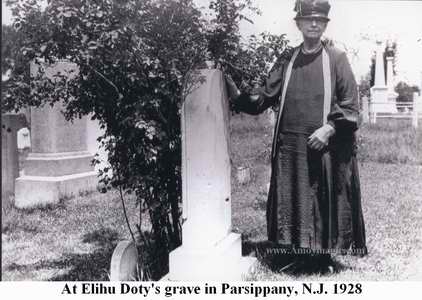
I want to write of the wonderful faithfulness and loving kindness of grandmother
in connection with these letters. She was intensely interested in all
news of the War, in a very intelligent way. A courier brought a daily
paper of the latest hour of printing from Morristown ( seven miles a v/ay)
to add to the slower information arriving in evening or late afternoon,
of the day beforeˇŻs A vivid picture, continuing through the four years,
rises up, of grandmother sitting at the table, with a candlestick in hand,
whose lighted flame, held close to the printed page, moved back and forth
across the columns, with lips moving in eagerness, reading the news, and
often bowing her head in grief and distress at the awful wreckage of the
War, and the disturbing news often brought.
In her letters to father, she painstakingly gave him her impression of
the forward march of events, with wise judgment gathered from her grasp
of them. But she not only gave of herself in long, finely written letters,
every month; but she brought about no failure in the children's monthly
letters, and in the latter part of the time, Sammy and little "Mousie"
also added theirs. We wrote the first copy on slates, and she corrected
each one so as to make quite presentable letters! Then ee recopied them
on thin blue or white paperˇŞused universally in foreign correspondence
at that timeˇŞso thin, that often the steel pens used, would break through
and mske holes, and we wrote on both sides of this thin paper, too; a
task wearisome to grandmother, as well as to the children. We sent these
letters during the four years he was away. I do not remember that they
failed him ever, or that he ever failed us. Once the month's package was
late; and finally it came to us in a blackened envelope, stamped across
with the statement that this package had been brought up from the bottom
of the Indian Ocean, when the bed had been dragged for mail which went
down in the wreck of a British mail steamer.
[Mail &
DotyˇŻs Death] Another exciting incident in connection with our
mail was when father was returning to America the last time. He sent a
letter just as he was leaving Amoy, which
caught a mail ahead of him, stating that the captain of the "H. B.
Palmer" had decided to change the course of his vessel to crossing
the Pacific to California, instead of taking the usual one through the
Indian Ocean.
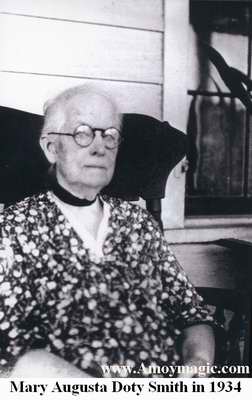 This proved to be a ruse to put the "S. S. Alabama" off their
track, as she was prowling about the China waters (1863-'65) to destroy
ships flying the Federal flag! so the "N. B. Palmer" started
due east, for California for three days out, then turned southwest, into
the Indian Ocean, and so on to America.
This proved to be a ruse to put the "S. S. Alabama" off their
track, as she was prowling about the China waters (1863-'65) to destroy
ships flying the Federal flag! so the "N. B. Palmer" started
due east, for California for three days out, then turned southwest, into
the Indian Ocean, and so on to America.
In this fourth year, he was ordered by the physician to draw his work
to a close and return to his homeland, his health having entirely failed
him; but four days before he reached these shores, his spirit entered
the new life. We knew the "N.B. Palmer" was daily expected,
and watched the papers to catch the first shipping news, before the slow
mail coming late in the afternoon might have brought us letters of information.
And so word came to us at the close of the shipping paragraph, stating
that the ˇ°N. B. Palmer had docked, March 18, 1865, with notice of his
death at the end.
His body lies buried in the Cemetery at Parsippany, New Jersey, in the
plot where mother would have lain, if she had reached her old home before
that event came to her.
Mary Augusta Doty Smith
March 4, 1931
Note from Mr. Elwood Geiger, a
Doty descendant: A well-known historian claims Commodore Perry never visited
Amoy--but Mary remembers his visit, and even
monogrammed a handkerchief for him! 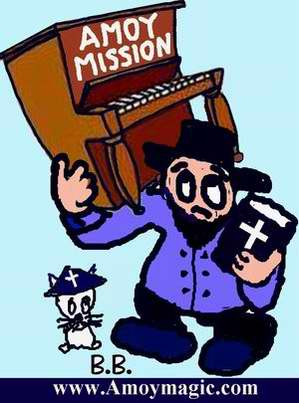
E-mail: amoybill@gmail.com
Snail Mail: Dr. William Brown
Box 1288 Xiamen University, Xiamen, Fujian
PRC 361005
TRAVEL
LINKS  Favorite
Fujian Sites
Favorite
Fujian Sites  Fujian
Foto Album
Fujian
Foto Album  Xiamen
Xiamen
 Gulangyu
Gulangyu
 Fujian
Guides
Fujian
Guides  Quanzhou
Quanzhou
 Zhangzhou
Zhangzhou
 Longyan
Longyan
 Wuyi
Mtn
Wuyi
Mtn  Ningde
Ningde
 Putian
Putian
 Sanming
Sanming
 Zhouning
Zhouning
 Taimu
Mtn.
Taimu
Mtn.  Roundhouses
Roundhouses
 Bridges
Bridges
 Jiangxi
Jiangxi
 Guilin
Guilin
 Order
Books
Order
Books Readers'
Letters New: Amoy
Vampires! Google
Search
Readers'
Letters New: Amoy
Vampires! Google
Search
Last Updated: October 2007
AMOY
MISSION LINKS
![]()
![]() A.M.
Main Menu
A.M.
Main Menu
![]() RCA
Miss'ry List
RCA
Miss'ry List
![]() AmoyMission-1877
AmoyMission-1877
![]() AmoyMission-1893
AmoyMission-1893
![]() Abeel,
David
Abeel,
David
![]() Beltman
Beltman
![]() Boot
Family
Boot
Family
![]() Broekema,
Ruth
Broekema,
Ruth
![]() Bruce,
Elizabeth
Bruce,
Elizabeth
![]() Burns,
Wm.
Burns,
Wm.
![]() Caldwells
Caldwells
![]() DePree
DePree
![]() Develder,
Wally
Develder,
Wally
![]() Wally's
Memoirs!
Wally's
Memoirs!
![]() Douglas,
Carstairs
Douglas,
Carstairs
![]() Doty,
Elihu
Doty,
Elihu
![]() Duryea,
Wm. Rankin
Duryea,
Wm. Rankin
![]() Esther,Joe
& Marion
Esther,Joe
& Marion
![]() Green,
Katherine
Green,
Katherine
![]() Hills,Jack
& Joann
Hills,Jack
& Joann
. ![]() Hill's
Photos.80+
Hill's
Photos.80+
..![]() Keith
H.
Keith
H.![]() Homeschool
Homeschool
![]() Hofstras
Hofstras
![]() Holkeboer,
Tena
Holkeboer,
Tena
![]() Holleman,
M.D.
Holleman,
M.D.
![]() Hope
Hospital
Hope
Hospital
![]() Johnston
Bio
Johnston
Bio
![]() Joralmans
Joralmans
![]() Karsen,
W&R
Karsen,
W&R
![]() Koeppes,
Edwin&Eliz.
Koeppes,
Edwin&Eliz.
![]() Kip,
Leonard W.
Kip,
Leonard W.
![]() Meer
Wm. Vander
Meer
Wm. Vander
![]() Morrison,
Margaret
Morrison,
Margaret
![]() Muilenbergs
Muilenbergs
![]() Neinhuis,
Jean
Neinhuis,
Jean
![]() Oltman,
M.D.
Oltman,
M.D.
![]() Ostrum,
Alvin
Ostrum,
Alvin
![]() Otte,M.D.
Otte,M.D.![]() Last
Days
Last
Days
![]() Platz,
Jessie
Platz,
Jessie
![]() Pohlman,
W. J.
Pohlman,
W. J.
![]() Poppen,
H.& D.
Poppen,
H.& D.
![]() Rapalje,
Daniel
Rapalje,
Daniel
![]() Renskers
Renskers
![]() Talmage,
J.V.N.
Talmage,
J.V.N.
![]() Talman,
Dr.
Talman,
Dr.
![]() Veenschotens
Veenschotens
. ![]() Henry
V.
Henry
V.![]() Stella
V.
Stella
V.
. ![]() Girard
V.
Girard
V.
![]() Veldman,
J.
Veldman,
J.
![]() Voskuil,
H & M
Voskuil,
H & M
![]() Walvoord
Walvoord
![]() Warnshuis,
A.L.
Warnshuis,
A.L.
![]() Zwemer,
Nellie
Zwemer,
Nellie
![]() Fuh-chau
Cemetery
Fuh-chau
Cemetery
![]() City
of Springs
City
of Springs
(Quanzhou, 1902!!)
![]() XM
Churches
XM
Churches ![]()
![]() Church
History
Church
History ![]()
![]() Opium
Wars
Opium
Wars
![]() A.M.
Bibliography
A.M.
Bibliography
![]() YMCA
Volunteer!
YMCA
Volunteer!
![]() XICF
Fellowship
XICF
Fellowship![]()
![]() Temples
Temples![]()
![]() Mosques
Mosques
![]() Christ
in Chinese
Christ
in Chinese
Artists'
Eyes
DAILY LINKS
![]() FAQs
Questions?
FAQs
Questions?
![]() Real
Estate
Real
Estate
![]() Shopping
Shopping
![]() Maps
Maps
![]() Bookstores
Bookstores
![]() Trains
Trains
![]() Busses
Busses
![]() Car
Rental
Car
Rental
![]() Hotels
Hotels
![]() News
(CT)
News
(CT)
![]() Medical
& Dental
Medical
& Dental
![]() Expat
Groups
Expat
Groups
![]() Maids
Maids
![]() Phone
#s
Phone
#s
EDUCATION
![]() Xiamen
University
Xiamen
University
![]() XIS(Int'l
School)
XIS(Int'l
School)
![]() Study
Mandarin
Study
Mandarin
![]() CSP(China
Studies)
CSP(China
Studies)
![]() Library
Library
![]() Museums
Museums
![]() History
History
DINING ![]() Tea
Houses
Tea
Houses
![]() Restaurants
Restaurants
![]() Asian
Asian
![]() Veggie
Veggie
![]() Junk
Food
Junk
Food
![]() Chinese
Chinese
![]() Italian
Italian
![]() International
International![]()
![]() Visas
4 aliens
Visas
4 aliens
RECREATION
![]() Massage!
Massage!
![]() Beaches
Beaches
![]() Fly
Kites
Fly
Kites
![]() Sports
Sports
![]() Boardwalk
Boardwalk
![]() Parks
Parks
![]() Pets
Pets
![]() Birdwatching
Birdwatching
![]() Kung
Fu
Kung
Fu ![]() Hiking
Hiking
![]() Music
Events
Music
Events
![]() Cinema
Cinema
![]() Festival&Culture
Festival&Culture
![]() Humor&
Humor&![]() Fun
Fotos
Fun
Fotos![]()
BUSINESS
![]() Doing
Business
Doing
Business
![]() Jobs!(teach/work)
Jobs!(teach/work)
![]() Hire
Workers
Hire
Workers
![]() Foreign
Companies
Foreign
Companies
![]() CIFIT
(Trade Fair)
CIFIT
(Trade Fair)
![]() MTS(Translation)
MTS(Translation)
![]()
Back to Top
